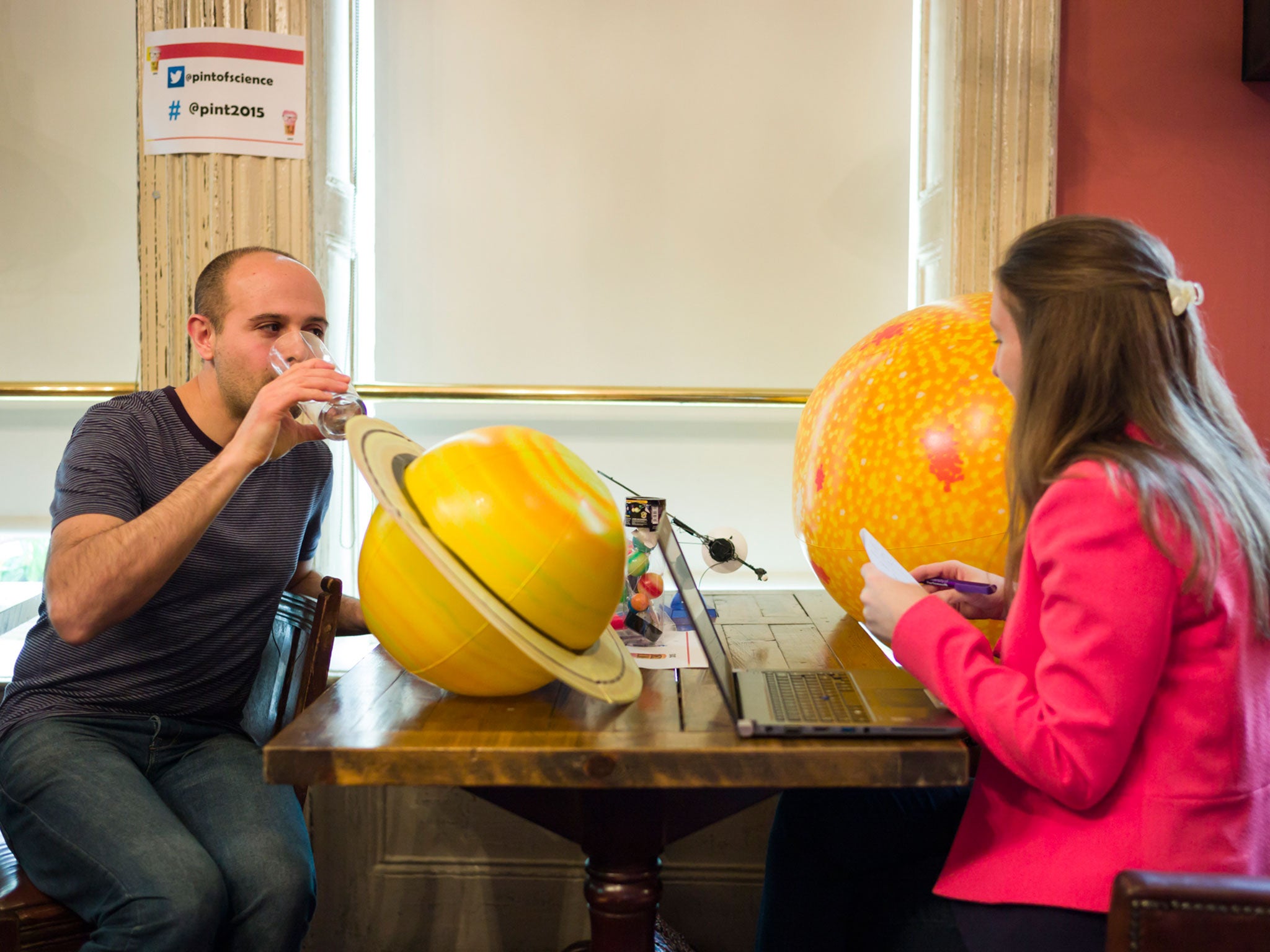Scientists set to hit over 70 UK pubs in the Pint of Science festival
With organisers promising 'science’s answer to Glastonbury', topics include the potential problems of living to 300 and 'how to preserve your mummy'

If everything goes to plan, it will be the perfect opportunity to present the not necessarily sober voice of science.
Starting on 18 May, the three-day Pint of Science festival, “for lovers of science and beer”, will allow scientists to take over about 70 UK pubs to discuss their research with 10,000 members of the public at 205 events across the country.
With organisers promising “science’s answer to Glastonbury”, topics include the potential problems of living to 300, hangovers, and “how to preserve your mummy” – which involves a professor of bioarchaeology talking about “bog bodies, freeze-dried corpses and mummified Egyptian kings”. In one Birmingham pub, leading academics will be assisted by “Dora, the crisp-distributing robot”. For the ultra-ambitious, a gastropub in Camden, north London, will be hosting an event entitled “How to win a Nobel Prize”. And with the festival now having gone global, thousands of people in eight other countries from Australia to Brazil will be attending similar events.
Dr Praveen Paul, 35, the festival’s co-founder, said that for scientists it was a chance to escape the lab and meet the people affected by their research, or paying for it via their taxes. The idea for Pint of Science, she said, came in 2012 at Imperial College, London, in discussions with her fellow neuroscience researcher Michael Motskin.
“We were researching Parkinson’s and motor-neurone diseases,” she said, “but at a very molecular level, peering down a microscope at a cell, repeating things again and again, and never meeting the people affected by the disease. Which can get demoralising.
“We organised a ‘meet the patients’ event, which allowed them to see how far the research had progressed, while being very rewarding for us because it put into context what we were doing. It made us think, ‘Let’s get this out to more people’. And the most successful place to do that would be the pub.”
Since the inaugural 2013 Pint of Science festival, the event has grown to involve 500 UK academics from 22 universities. “It has become like science’s answer to Glastonbury,” said Dr Paul, “with all sorts of things going on all over the place.”
Talking science in a pub, she said, helped close the knowledge gap between the researchers and the public.
“When I told my friends I was growing mice or rat brain cells in a dish, they would think it was the stuff of science fiction – when it’s fact it’s just normal stuff.
“UK universities are always cited as being at the forefront of global research, so we should be showing what we are doing.
“Science is always perceived as this boring thing, but we want people to know it affects everybody’s lives – involving everything including computers, illnesses and hangovers, where the cause and potential treatment are all about chemistry.”
She added: “People do get worried about things like three-parent babies, and hearing about it directly from a scientist, rather than via a newspaper, probably does help them get a better understanding”
And it wasn’t just the public who benefited, she said. “The scientists love it. With research, you can get bogged down into looking at one tiny thing. The public can come up with amazing questions, and amazing ideas, which can lead you to look at what you are doing in a new way.”
It was a view enthusiastically endorsed by Professor Bob Stone, who will be assisted by Dora the crisp-distributing robots at Monday evening’s “Robots on the Loose” event in Birmingham’s Island Bar.
Professor Stone, the director of the Human Interface Technologies Team at Birmingham University, said: “Some of us may be professors, but it is never too late for us to learn, and the public are very good at bringing us back to reality, which really does inspire us.”
Dr Paul promised demonstrations of experiments, question-and-answer sessions, and informality rather than jargon and acronyms. “The scientists will be drinking beer as well. They won’t be completely stone cold sober. And a few beers might help everyone’s understanding.”
Pub science: Our pick of the talks
Bath: Die Another Day, The Ram, Claverton Buildings, 7.30pm-9pm Monday. Discussing the possibility of living to 300, and having to work for 50 years or more.
Birmingham: Robots on the Loose, Island Bar, 7pm-9pm Monday. Looking at the latest on augmented reality research – with bar snacks available from Dora the crisp-distributing robot.
Bristol: Vice night, cigarettes and alcohol, The Green Bank, Easton, Tuesday, 7pm-9.30pm. Is the design of pubs contributing to excessive alcohol use?
Cambridge: Bugs and Drugs, Panton Arms, 7pm-9pm Monday. A cheery night discussing the rise of HIV, Sars, Ebola and drug-resistant bacteria.
Glasgow: Parasite Pals, The Butterfly and Pig, Bath Lane, 7pm-9pm Tuesday. “A whistle stop tour of the best parasites, with interesting parasite trivia.”
London: How to Win a Nobel Prize, The Prince Albert, Camden, 7pm-11pm Monday. Learn how to become a world-famous scientist.
Oxford: Worm tales, Wig and Pen, George Street, 7.30pm-9.30pm Monday. “What the nematode worm can tell us about the human body.”
York: My Voice and Me (With a G&T), Brigante, Micklegate, 7.30pm-9.30pm Monday. How professional speakers and singers look after their voices.
Join our commenting forum
Join thought-provoking conversations, follow other Independent readers and see their replies
Comments